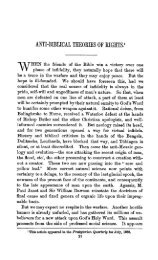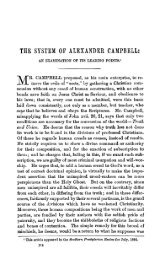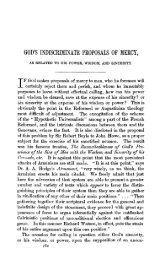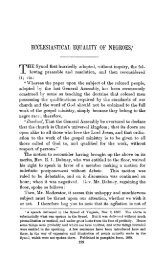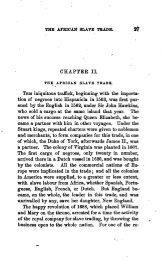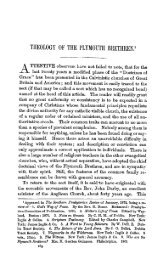The Latest Infidelity.pdf 487KB May 19 2009 - R.L. Dabney Archive
The Latest Infidelity.pdf 487KB May 19 2009 - R.L. Dabney Archive
The Latest Infidelity.pdf 487KB May 19 2009 - R.L. Dabney Archive
You also want an ePaper? Increase the reach of your titles
YUMPU automatically turns print PDFs into web optimized ePapers that Google loves.
536 THE LATEST INFIDELITY<br />
and watch the proceedings of a certain stranger, of whom all we<br />
know as yet is that he claims a high reputation for amiability,<br />
philanthropy, equity and charity. He tells us that it is a peren-<br />
nial pleasure to him to witness and reward all benevolent and<br />
generous actions. I say to him, "Stranger, so far, well. I must<br />
now point you an opposite object. <strong>The</strong>re stands a young repro-<br />
bate, the son of a devoted widDwed mother, who is known to<br />
have robbed her of her little property, to neglect her wants in<br />
her destitution, to heap reproaches and curses upon her, and<br />
even to strike her venerable face. What are your feelings<br />
towards that object?"" We suppose the stranger to answer, "Oh,<br />
sir, I assure you I am too thoroughly amiafole to have any feel-<br />
ing about it. True, I see nothing in it to admire, but I am too<br />
affectionate to detest anything. I have no feeling at all towards<br />
that reprobate." I ask, would anybody believe him? Or, if we<br />
believe his statement that he felt no reprehension for so de-<br />
testable a son, must we not set him down also as a cold-blood-<br />
ed villain, whose pretended charity was all sheer hypocrisy?<br />
Such is the judgment of every man's common sense.<br />
Let us pass now from the virtuous .principle in man to<br />
God. I assert that my argument only 'becomes the stronger.<br />
<strong>The</strong> perfectness of God's virtues only renders it more conclu-<br />
sive, because the purity, the equity, the truth, the love of God<br />
are infinite. It is therefore only the more certain that the cen-<br />
tral principle which makes him approve and love the virtuous<br />
must prompt him to reprehend the vicious. Men vainly imag-<br />
ine*that it would be a delightful theology to have a God so<br />
amiable as to be sure to reward all good things, tout also too<br />
amiable to be capable of punishing any evil 'thing. <strong>The</strong>y de-<br />
mand an impossibility. <strong>The</strong> only way to reach it would be to<br />
have a God without any moral qualities at all. Who would<br />
wish to live under an omniscient and omnipotent Ruler who<br />
was not capable of knowing or caring whether he was reward-<br />
ing the wicked and punishing the good? If we must desire<br />
such moral principle in our Supreme Ruler as will be always<br />
certain of acting amiably and justly towards the good, then<br />
we must be willing that he shall be equally certain to repre-<br />
hend the wicked. If they would have a God too amiable to<br />
maintain a hell, they must accept one who is also tOD careless<br />
and heartless to provide any heaven.



